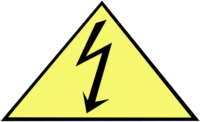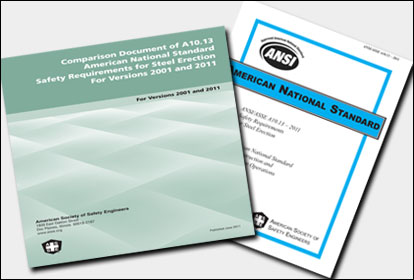 A company should have a Code of Conduct that is understood through training and sign offs. After that it's a matter of implementation and enforcement. Usually these behaviors are a sign of larger issues that must be investigated and dealt with. Without follow through it will likely make the situation worse and potentially critical.
A company should have a Code of Conduct that is understood through training and sign offs. After that it's a matter of implementation and enforcement. Usually these behaviors are a sign of larger issues that must be investigated and dealt with. Without follow through it will likely make the situation worse and potentially critical.
-Dora , a health and safety consultant
Public authorities -- elected officials and community "leaders," who aggressively stultify members of the public when bad practices are challenged, discourage problem-solving in many arenas (schools, volunteer organizations, government agencies). These leaders may espouse the very codes of conduct they ignore, thus thwarting participation in effective governance. This is a vicious cycle that is emulated in hostile workplaces, where powerful "irreplaceable" staff members are unchecked in their mistreatment of peers and subordinates.
-Betsy
We must strongly state that we want people to report anything that makes them feel uncomfortable or threatened, keep that report totally confidential, and support everyone involved. That would include the person who made the other person feel uncomfortable. Many times, people who overstep boundaries are not aware that they have done so, and would respond positively to some help learning where those boundaries are. So keeping the incident very private and non-accusatory could facilitate their cooperation.
Finally, everyone needs to re-evaluate their own behaviors, and make sure that we ourselves are not making others uncomfortable, even for the best of motives. People who are encouraged to do things better are more apt to comply than people who are berated for actions that they may not see as harmful.
-Martha, a regulatory coordinator
First incident is a stern warning. Second incident, we send people to the Employee Assistance Program for counseling on anger management. Third incident is termination. Seems to work well for us.
-David, an HR business partner and EHS manager
Certainly these people should enter the disciplinary process. A recorded verbal warning and associated support if necessary e.g. counseling. If needs be progress to written warnings and finally dismissal.
-Simon, an EH&S manager
Let me throw a twist into the mix, as I witnessed it on a previous job. What happens if the employee filing the complaint is only doing it as a political move or a personal vendetta?
-John, an EHS manager
From what I have seen with various companies the reality of the situation is a definitive fear of retaliation. However...This is where our relationships come into play. If we, as professionals, develop relationships with everyone in the organizational team then a sort of "trust" factor is born. I've never had an employee come to me with a concern out of the goodness of their heart. Either they believed something was in it for them or they simply trusted me.
Here in also lies a problem. If an employee says they are being emotionally bullied by their supervisor...How do you approach the supervisor without them knowing exactly who came to you and voiced their concern? They're gonna know...Make no mistake about it.
Now you have an employee who trusts you but knows that their identity and "anonymity" will be exposed the second you approach the accused.
When this occurs I immediately go to the supervisor’s senior manager and discuss the allegation with them and HR. This way we can all come to a successful course of action together.
No one should have to work in a hostile atmosphere in order to make a living.
-John, an EHS manager
It’s good to have an informal forum around issues such as these, A friendly mental nudge to a manager in a public open forum with no documentation can redirect without fear or threat, or let it be known there is a problem.
Too often these projects are pressure cookers rather than slow cookers, and by the very nature if you work in the "kitchen" a thick skin is required, and there is no time for added conflict of harassment. It's accept the abuse or be unemployed.
It's best to have a forgiving nature and push toward the door that leads to mental health balanced with acceptable compensation. Learn to laugh, it helps the heart. Make choices to remove pressure from the conflict, give yourself the right to a mental health day. Bosses take note: mental health days are better than losing needed skills long term.
-Julian, a health physics technician
Training is very important and so is understanding. This a very complex subject --if I tapped or squeezed someone's arm or hand and said “well done” , someone might say that that was harassment.
So it is important that there is a confidential outlet for these feeling and someone to understand.
-Roger, occupational health and safety consultant
Sensitivity training is good… but what if the person getting in your face just wants to control the situation with no regard to individual differences.. . and just plain wanting to criticize anything that you say, how you say it.
-Gloria, an occupational health nurse
Immediate termination. Sensitivity training has been done, all workers advised at safety meetings, and if investigation proves the individual engaged in abusive or threatening manner toward another employee, then immediate termination.
-Shannon, construction safety and security manager
I was a manager in a large company where another employee that I was managing was twisting my direction and helped to make it sound like I was not being fair to her. Not true at all.
This person was very intelligent and capable but at the same time always looking for ways to prove that I was not giving her enough freedom to do her job. She complained to HR, which I have to say the matter was not handled in favor of the proof in my documentation of the situation and was handled in favor of her constant complaining and pressure to management.
After seven years of an excellent record and several large raises, I ended up leaving because I felt like I was being bullied by my employee and HR and my management continued to let her rant and rave over untrue circumstances. Where is the protection from HR for managers when the are being bullied by employees?
-Diane
Most work places expose their employees to classes on “Respect and Responsibility”. They then have been informed as to proper conduct, expectations, and consequences. People other than the perpetrator or injured party can report these type of actions, as some may be too timid to complain. More people then just the victim can be affected. It can terrorize and polarize a work unit. Not good for the victim, business or safety.
-Frank, safety consultant
There needs to be is a consensus among equivalent staff or management as to what constitutes acceptable behaviour, to define whether the actions are really abusive, or just seems so in the mind of the individual. As others have noted, not all claims are legitimate...
It is simply unacceptable for HR to take “weeks” to deal with such issues once alerted, because the real implication is: Does the action or activity, approach or nature of the individual compromise health or safety? If the answer is in the affirmative, then it does not matter the nature of the complaint, action needs be taken. As EHS pProfessionals we can use these criterion to invoke a proportional and timely response.
Most business I encounter operate a three-step policy:
? Conversation and verbal warning
?Formal written warning
? Final written warning.
This provides ample flexibility with no requirement for a specific channel. The first reported instance of abusive behaviour of bullying may represent the first instance, or it may represent the first report of a longstanding pattern. Investigation is the only way to establish whether the individual is experiencing problems of a professional or private nature, whether the reporter has an `axe to grind` or whether this is simply the latest in a long line of abuse. Each demands response, but each to its own.
These things matter as the effect is like a canker in the business - it demoralizes and demotivates, and can lead to significant reductions in productivity, as well as the previously mentioned implications for health & safety of the workforce and the business.
-Simon
First you need to understand the culture of the region and the industry. Having worked in the Northeast twice in my career I can only say that there abuse it is a way of life. They blame, find fault, harass, yell, scream, demean, and intimidate. In the Midwest and the South people like that are shown the door quickly -- in the Northeast you are a strong manager.
-Tom, OSHA general industry and construction trainer
Many times the person who is being victimized doesn't want to say anything because they are new, or the person to whom they would tell is friends with the perpetrator, or they don't want to rock the boat or they just don't think of it as anything other than the normal Norming, Forming, Storming and Performing that all groups go through!
It isn't till there is a situation that becomes serious that they realize that this is in fact something more, such as a situation with a passive-aggressive bully. This is management’s fault if this is not recognized and dealt with. Many times though it is too late, as the person who is the aggressor will likely be listened to rather than the victim! Which is why it is so important for people to keep logs / diaries of any transgressions. If it ain't documented it never happened....! That is how most HR people will look at it and it will become a “he said she said” if there isn't the documentation to back it up!
-Pipeline site supervisor
Psychopaths walk the halls of our workplaces and sometimes without notice. Dr Clarke, who wrote “Working with Monsters,” identifies traits of the psychopath...as follows:
- No guilt
- No remorse
- No conscience
- Superficial charm
- Excessive sense of self-worth
- Pathological liar
- Cunning and manipulative
- Lack of empathy
- Promiscuous sexual behaviour
- Lack realistic long-term goals
- Impulsive
- Irresponsible
-Julian-Anne, educator and writer




